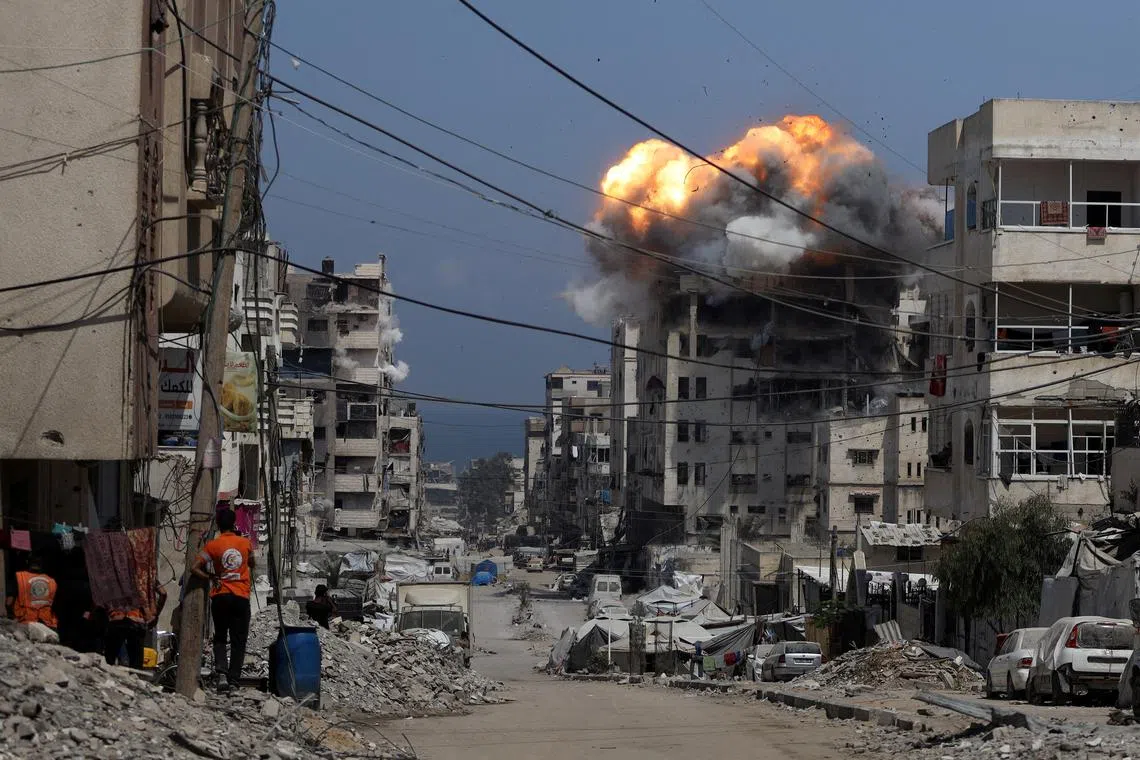Israel sends tanks into Gaza’s Deir al-Balah, raising concerns among hostage families
Sign up now: Get ST's newsletters delivered to your inbox

Smoke and flames rising from a residential building hit by an Israeli strike in Gaza city on July 21.
PHOTO: REUTERS
CAIRO – Israeli tanks pushed into southern and eastern areas of the Gazan city of Deir Al-Balah for the first time on July 21, an area where Israeli sources said the military believes some of the remaining hostages may be held.
The area is packed with Palestinians displaced during more than 21 months of war in Gaza, hundreds of whom fled west or south after Israel issued an evacuation order
Tank shelling in the area hit houses and mosques, killing at least three Palestinians and wounding several others, local medics said.
To the south in Khan Younis, an Israeli air strike killed at least five people, including a husband and wife and their two children in a tent, medics said.
In its daily update, Gaza’s Health Ministry said at least 130 Palestinians had been killed and more than 1,000 wounded by Israeli gunfire and military strikes across the territory in the past 24 hours, one of the highest such totals in recent weeks.
There was no immediate Israeli comment on the Deir Al-Balah and Khan Younis incidents.
Israeli sources have said the reason the army has so far stayed out of the Deir al-Balah districts is that they suspect Hamas might be holding hostages there.
At least 20 of the remaining 50 hostages in captivity in Gaza are believed to be still alive.
Families of the hostages expressed concern for their relatives and demanded an explanation from the army of how it would protect them.
Gaza health officials have meanwhile warned of potential “mass deaths” in the coming days due to mounting hunger, which has killed at least 19 people since July 19, according to the Hamas-run territory’s Health Ministry.
Hunger
They said hospitals were running out of fuel, food aid and medicine, risking a halt to vital operations.
Health Ministry spokesman Khalil Al-Deqran said medical staff have been depending on one meal a day, and that hundreds of people flock to hospitals every day, suffering from fatigue and exhaustion because of hunger.
In southern Gaza, the Health Ministry said an Israeli undercover unit had detained Dr Marwan Al-Hams, head of Gaza’s field hospitals, on July 21 in a raid that killed a local journalist and wounded another outside a field medical facility run by the International Committee of the Red Cross (ICRC).
An ICRC spokesperson said the ICRC had admitted and treated patients injured in the incident but would not comment further on their status in order to protect their privacy.
It said it was “very concerned about the safety and security” around the field hospital.
The Israeli military did not immediately respond to a request for comment.
Israel has raided and attacked hospitals across Gaza during the war, accusing Hamas of using them for military purposes, an accusation the group denies. Sending undercover forces to carry out arrests has been rare.
The incursion into Deir Al-Balah and the escalating number of deaths appeared to be complicating the latest push for a ceasefire between Hamas and Israel in talks mediated by Qatar and Egypt, with US backing.
A Hamas official told Reuters on July 20 that the militant group was angered over the mounting deaths and the hunger crisis in the enclave, and that this could badly affect ceasefire talks under way in Qatar.
Aid waiting
UNRWA, the UN refugee agency dedicated to Palestinians, said in a post on X on July 21 that it was receiving desperate messages from Gaza warning of starvation, including from its own staff, as food prices have increased fortyfold.
“Meanwhile, just outside Gaza, stockpiled in warehouses, UNRWA has enough food for the entire population for over three months. Lift the siege and let aid in safely and at scale,” it said.
On July 20, the Health Ministry said at least 67 people were killed by Israeli fire as they waited for UN aid trucks to enter Gaza, after saying at least 36 aid seekers were killed a day earlier.
Israel’s military said its troops had fired warning shots to remove what it said was “an immediate threat”. It said initial findings suggested reported casualty figures were inflated.
Israel’s military also said it “views the transfer of humanitarian aid into the Gaza Strip as a matter of utmost importance, and works to enable and facilitate its entry in coordination with the international community”.
The war began when Hamas-led militants stormed into Israel
The Israeli military campaign against Hamas in Gaza has since killed more than 59,000 Palestinians, according to health officials, displaced almost the entire population and plunged the enclave into a humanitarian crisis. REUTERS


